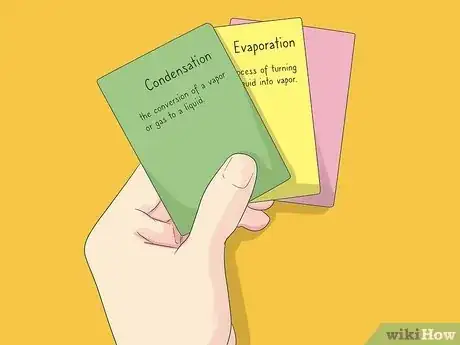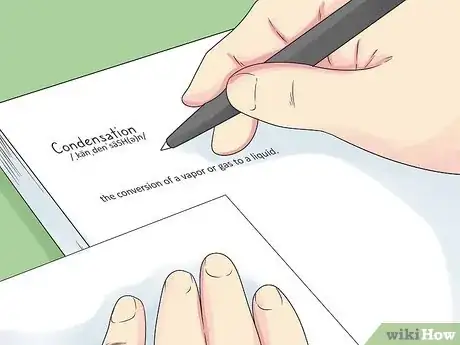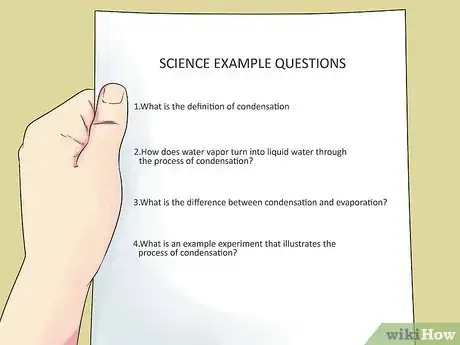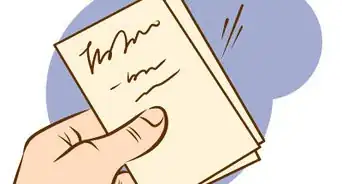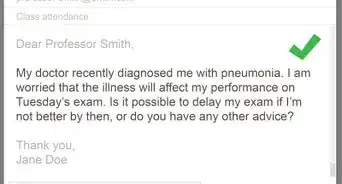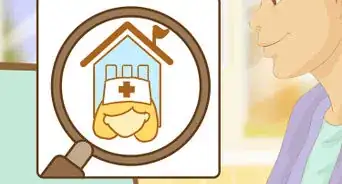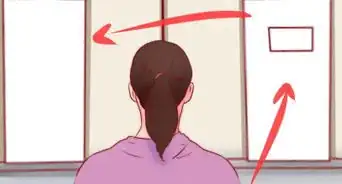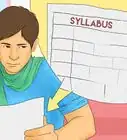This article was co-authored by Bryce Warwick, JD. Bryce Warwick is currently the President of Warwick Strategies, an organization based in the San Francisco Bay Area offering premium, personalized private tutoring for the GMAT, LSAT and GRE. Bryce has a JD from the George Washington University Law School.
wikiHow marks an article as reader-approved once it receives enough positive feedback. In this case, 80% of readers who voted found the article helpful, earning it our reader-approved status.
This article has been viewed 46,725 times.
Studying for a science test can be daunting, especially if you struggle with time management as you prepare for a test. Whether you are studying for a science test at the high school or university level, you should first look for a quiet study area where you can concentrate and then prepare review materials related to the test. You should then focus on reviewing the materials at least one week before the test so you have time to study and can improve your chances of doing well on the science test.
Steps
Choosing a Study Area
-
1Look for a quiet study area at your school library. A free study option is always a study area in your school library, where you can be surrounded by other students who are focused and diligently working on their own study materials. Many school libraries will have quiet areas or zones for studying and encourage students to use the school space to prepare for tests.[1]
- If you are planning to study with a partner, you may be able to book a private study room where you can discuss the test and share review materials. This will ensure you can talk to your study partner without disturbing anyone around you. Talk to the circulation desk at your library about booking a study room or look at your school’s library website for more information on booking a study room.
-
2Choose a secluded spot in a local coffee shop. If you prefer to study in the cozy atmosphere of a nearby coffee shop, be sure to bring headphones with you. They may come in handy if you are around people who are talking loudly or having a conversation close to you that is distracting.
- Some coffee shops are known for their quiet environment, especially if they are located on the school campus and are frequented by many students. Consider choosing a coffee shop that is known for its student-friendly atmosphere, rather than a coffee shop that is loud, bustling, and often crowded. This will ensure you will be able to get work done without being constantly interrupted or distracted by noise and chatter around you.
Advertisement -
3Study at home in an area free from distractions. Some students prefer to study in the comfort of their home in their bedroom or in a room in the house that is free of distractions.[2] You may want to set the scene if you are studying at home to make it the most study friendly.[3]
- This could include telling everyone in the house that you are studying and shutting the door. Or, you could turn off any distractions, like the television, a radio, or your cellphone, and place them out of reach. This could then help you to focus on studying for the science test.
- While it may be tempting to lie in bed as you study, data has shown that studying in bed can lead to distraction and difficulty turning off your brain when it’s time to go to bed. Instead, study at a desk in your room with a desk lamp so you get enough light and can focus on your study materials.
Reviewing Your Study Materials
-
1Read over your class notes. Good class notes from your teacher’s lectures and class discussions can be great study tools for tests and exams. Look over your class notes and check if there are incomplete sentences or any confusing statements. Clarify anything you missed in class or are still confused about with your teacher so you can better prepare for the upcoming test. If you have an incomplete chemistry formula written down, for example, you should clarify the complete formula with your teacher or a peer.[4]
- Focus on recent class notes, especially the notes made in your most recent class, as they will likely contain important information you can use to prepare for the test. One of the best ways to make your class notes more instructive is to use visual diagrams and representations, such as the scientific process of condensation. Drawing out scientific processes can help you to better visualize them and remember them later.
-
2Highlight any key points that may relate to the test. Use a highlighter to go through your class notes and identify any key points that seem relevant to the test. Marking important concepts with a highlighter will allow you to easily scan your notes and digest complex information through the key details or points.[5]
- For example, you may have notes of the process of condensation from your chemistry class or notes on the digestive system from your biology class. These processes can be detailed and contain a lot of information that can be challenging to remember. Using a highlighter to identify key points can help you to focus on the most important details in the process without getting overwhelmed by information.
- In your notes on the process of condensation, for example, you may start with a definition of condensation: “The process of changing water vapor in the air into liquid water.” Rather than highlight the entire sentence, you may highlight the terms “water vapor” “air” and “liquid water”. This will help you remember the key terms of the definition so you can recall it easily when you take the test.[6]
-
3Ask your teacher for a study guide for the test. Your teacher may provide a guide for the test that contains example questions or a list of key points that are going to be on the test. Make sure you have a copy of the study guide and use it when preparing for the test.[7]
- You should clarify the form of the test, such as multiple choice, short answer, or true/false. The form of the test will then help you better prepare for the test.[8] If the test is multiple choice or true/false, you may want to focus on memorizing key definitions, examples, and concepts. If the test is short answer, you may want to practice writing out short answers that explain key definitions and concepts.
- An example study guide for a test on condensation, for example, may contain questions like, “What is the process of condensation?” “How is condensation different from evaporation?” “How can we demonstrate condensation in an experiment?” Though these questions may not be the exact ones used on the test, they will likely point to key concepts or points that you should study in preparation for the test.
-
4Make study flash cards. Flashcards can be useful for studying difficult concepts, especially if you are trying to remember key definitions and terms. You may decide to use a color coded system to separate key definitions from key concepts and write them on different colored flashcards.
- If you are creating flashcards for a test on the process of condensation, for example, you may write the definition of condensation on a green flashcard and the difference between condensation and evaporation on a yellow flashcard. You may then write the definition for evaporation on a green flashcard and the use of a pressure temperature graph on a yellow flashcard.
- Separating definitions from concepts can allow you to test yourself on different things using the flashcards, but still ensure they remain separate as you review them. The color coding can also help you distinguish between a definition and a concept.
-
5Use the “chunking” method. Recent studies have shown that studying information in chunks, also known as spaced repetition, can help you to better retain information and access it later during a test. Rather than try to memorize the entire condensation process or the complete digestive process in humans, you can break up the information into smaller sections or chunks and study each section over a period of time.[9]
- Break up your study materials into chunks using a highlighter or a pen. You can also cover the information around the section with a piece of blank paper so you are only focusing on the one chunk, instead of the surrounding information. This will prevent you from getting distracted and allow you to stay focused on one section at a time.
-
6Create a study schedule. Once you have reviewed and organized your study materials, you should create a study schedule. A study schedule will allow you plan your study time in the most efficient manner possible and avoid procrastinating or wasting time.[10] Try to plan your study schedule at least one to two weeks before the test. This will give you more than enough time to prepare and will ensure you stick to your study schedule.[11]
- The study schedule should include one to two studying methods and indicate how many hours a day you will be studying for the test. Try to plan out exactly how much time you will allot to each method and ensure you are able to cover all the information required for the test within the allot timeframe. Keep in mind most people can concentrate well for 45 minutes before losing interest or zoning out. Take breaks between study sessions if you plan to study for more than 45 minutes at a time.
- For example, on Monday night, you may do a twenty minutes session using the chunking method, followed by a review of key definitions using flashcards for twenty five minutes. On Tuesday night, you may do a review of the previous night’s studying and then move on to a new section in your notes. Once you complete a twenty minute session using the chunking method on a new section, you may do another round of review of key concepts with your flashcards for twenty five minutes. You may then continue this pattern until Friday, and do a big review day on the weekend, taking breaks between study sessions so you can digest the information in your study materials.
Testing Your Knowledge
-
1Do example test questions. Once you have spent at least one week studying for the test, you should gear up for the test by doing example questions. These may be example questions created by your teacher in a study guide or you may create your own example questions.[12]
- Create enough test questions to fulfill the structure of the test. For example, if your teacher tells you the test will have ten multiple choice questions total, you should create at least ten to fifteen practice multiple choice questions. If your teacher tells you there will be four true/false questions and four short answer questions, make sure your example test questions follow the same format.
- For a test on the process of condensation, for example, you may create test questions that cover the major concepts and definitions for this process, such as: “What is the definition of condensation?” “How does water vapor turn into liquid water through the process of condensation?” “What is the difference between condensation and evaporation?” “What is an example experiment that illustrates the process of condensation?”
-
2Grade your example test questions and identify any gaps in your knowledge. Once you have completed the example test questions, you should look over them and grade them. You may want to enlist a study partner to grade your example test questions for you, such as a peer or a family member. If you are studying with a peer in a study group, exchange test questions with them so you can grade each other.[13]
- When you grade your test questions, note any questions that you got wrong or could not answer. These gaps in your knowledge can be helpful to identify, as you can then focus on filling these gaps when you review your study materials again.
-
3Have a study partner quiz you on the key points the day before the test. To boost your confidence and ensure you do not have any lingering gaps in your knowledge, have a study partner quiz you using example questions. If you don’t have a peer nearby, ask a family member, a friend, or a spouse to act as your tester.[14]
- Have your study partner read the questions out loud and then respond to the questions out loud. Vocalizing your answers can help you to remember them better and ensure your brain is full of relevant information that will help you ace your science test.
Expert Q&A
Did you know you can get expert answers for this article?
Unlock expert answers by supporting wikiHow
-
QuestionWhat is the best way to study for a test?
 Bryce Warwick, JDBryce Warwick is currently the President of Warwick Strategies, an organization based in the San Francisco Bay Area offering premium, personalized private tutoring for the GMAT, LSAT and GRE. Bryce has a JD from the George Washington University Law School.
Bryce Warwick, JDBryce Warwick is currently the President of Warwick Strategies, an organization based in the San Francisco Bay Area offering premium, personalized private tutoring for the GMAT, LSAT and GRE. Bryce has a JD from the George Washington University Law School.
Test Prep Tutor, Warwick Strategies
-
QuestionHow many hours should I study for a science test?
 Bryce Warwick, JDBryce Warwick is currently the President of Warwick Strategies, an organization based in the San Francisco Bay Area offering premium, personalized private tutoring for the GMAT, LSAT and GRE. Bryce has a JD from the George Washington University Law School.
Bryce Warwick, JDBryce Warwick is currently the President of Warwick Strategies, an organization based in the San Francisco Bay Area offering premium, personalized private tutoring for the GMAT, LSAT and GRE. Bryce has a JD from the George Washington University Law School.
Test Prep Tutor, Warwick Strategies
-
QuestionWhat do I do if no one thinks I'm smart enough?
 Community AnswerIgnore them. They are doing nothing to help you. You know what you can do, and that's all that matters.
Community AnswerIgnore them. They are doing nothing to help you. You know what you can do, and that's all that matters.
References
- ↑ http://greatist.com/happiness/better-study-tips-test
- ↑ Bryce Warwick, JD. Test Prep Tutor, Warwick Strategies. Expert Interview. 5 November 2019.
- ↑ http://greatist.com/happiness/better-study-tips-test
- ↑ http://kidshealth.org/teen/school_jobs/school/test_terror.html#
- ↑ http://www.scientificamerican.com/article/test-your-study-skills-quiz/
- ↑ http://study.com/academy/lesson/what-is-condensation-definition-examples-quiz.html
- ↑ http://kidshealth.org/teen/school_jobs/school/test_terror.html#
- ↑ Bryce Warwick, JD. Test Prep Tutor, Warwick Strategies. Expert Interview. 5 November 2019.
- ↑ http://greatist.com/happiness/better-study-tips-test
- ↑ Bryce Warwick, JD. Test Prep Tutor, Warwick Strategies. Expert Interview. 5 November 2019.
- ↑ http://kidshealth.org/teen/school_jobs/school/test_terror.html#
- ↑ http://www.scientificamerican.com/article/test-your-study-skills-quiz/
- ↑ http://kidshealth.org/teen/school_jobs/school/test_terror.html#
- ↑ http://kidshealth.org/teen/school_jobs/school/test_terror.html#
About This Article
To study for a science test, do some sample test questions and then focus on the parts of the test you struggle with the most. Use your notes from class and any study guides you were given to review the material. Also, make flashcards or find some online to study with. You can also try breaking the material up into smaller sections and reviewing one section at a time since that can actually help you retain information better. To learn how to choose a good place to study, read on!







